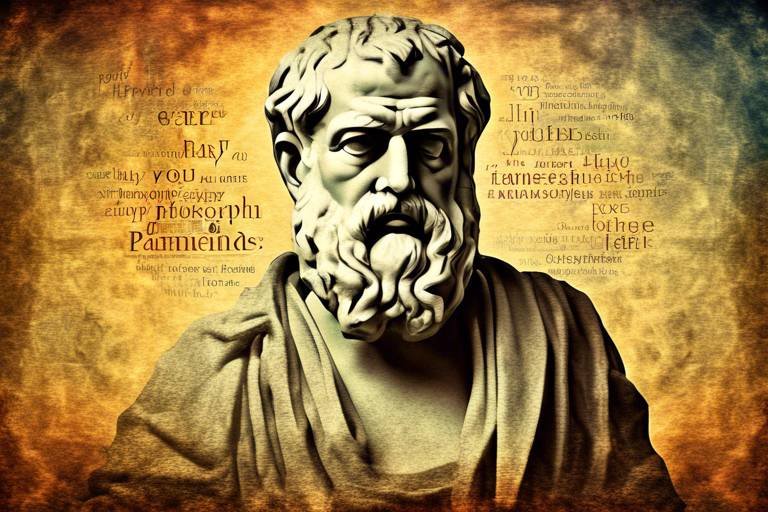Cynic Philosophy - Insights from Diogenes of Sinope
Cynic philosophy, a fascinating and often misunderstood school of thought, invites us to peel back the layers of societal norms and expectations. At the heart of this philosophy lies the remarkable figure of Diogenes of Sinope, a man whose life and teachings resonate even today. Imagine living in a world where the pursuit of material wealth and social status is abandoned in favor of simplicity and virtue. Diogenes did just that, living a life that challenged the very fabric of his society. He was not just a philosopher; he was a provocateur, a rebel who dared to question the status quo and advocate for a more authentic existence.
Born in the 4th century BCE, Diogenes became the face of Cynicism, a movement that emerged in ancient Greece, advocating for a return to nature and a rejection of artificial constructs. Cynics believed that true happiness could only be achieved by living in accordance with nature and embracing a life of virtue. Diogenes took this philosophy to the extreme, often using his life as a canvas to paint a picture of what it meant to live authentically. His antics and sharp wit were not mere acts of defiance; they were profound statements about the absurdity of societal norms.
In essence, Diogenes's life was a masterclass in minimalism. He famously lived in a barrel, a symbol of his rejection of materialism and a testament to his belief in self-sufficiency. This choice was not just about physical living conditions; it represented a deeper philosophy that questioned the very foundations of human existence. What do we truly need to live a fulfilling life? Is it wealth, possessions, or is it something more profound? Through his actions, Diogenes forced those around him to confront these questions, urging them to consider what it means to live a good life.
As we delve deeper into the teachings of Diogenes, we uncover a treasure trove of insights that challenge our contemporary understanding of success and happiness. His life was a constant reminder that societal approval is fleeting and that true virtue lies in authenticity. In a world increasingly driven by consumerism and superficial values, the lessons from Diogenes are more relevant than ever. They invite us to reflect on our own lives and consider whether we are living in alignment with our true selves or merely conforming to societal expectations.
In the following sections, we will explore the origins of Cynicism, the life of Diogenes in greater detail, and the key teachings that continue to inspire individuals seeking a more meaningful existence. We will also compare Cynicism with Stoicism, another prominent philosophical movement of the time, to highlight the unique contributions of Diogenes and his followers. Ultimately, this exploration aims to illuminate how the radical ideas of Cynic philosophy can inform our understanding of modern issues, from authenticity to consumer culture.
- What is Cynic philosophy? - Cynic philosophy is a school of thought that emphasizes living in accordance with nature and prioritizing virtue over societal approval.
- Who was Diogenes of Sinope? - Diogenes was a prominent Cynic philosopher known for his unconventional lifestyle and sharp critiques of social norms.
- What does living in a barrel symbolize? - Diogenes's choice to live in a barrel symbolizes his rejection of materialism and his commitment to a life of simplicity and self-sufficiency.
- How does Cynicism differ from Stoicism? - While both philosophies value virtue, Cynicism focuses on individualism and personal freedom, whereas Stoicism emphasizes communal responsibility and emotional resilience.
- Why are Diogenes's teachings relevant today? - Diogenes's insights encourage us to question societal values, embrace authenticity, and reconsider what it means to live a fulfilling life in a consumer-driven world.

Origins of Cynicism
Cynicism, as a philosophical movement, emerged in ancient Greece around the 4th century BCE, a time when the flourishing city-states were grappling with issues of morality, ethics, and the essence of happiness. It was a reaction against the growing materialism and societal norms that seemed to prioritize wealth and status over virtue and simplicity. The Cynics believed that a life of virtue was attainable through self-sufficiency and living in harmony with nature, a stark contrast to the prevailing values of their time. This philosophy was not just a set of beliefs but rather a way of life that challenged the status quo.
The roots of Cynicism can be traced back to Socratic thought, particularly the emphasis on questioning societal norms and seeking truth. However, it was Diogenes of Sinope, one of the most notable figures of this movement, who truly embodied the Cynic spirit. He took the teachings of Socrates and pushed them to their extremes, advocating for a lifestyle that rejected conventional comforts and societal expectations. The term "Cynic" itself is derived from the Greek word "kynikos," which means "dog-like," a reference to Diogenes's lifestyle and his disdain for the artificiality of human civilization.
At its core, Cynicism revolves around several key principles:
- Self-Sufficiency: The belief that true happiness comes from within and not from external possessions or validations.
- Living in Accordance with Nature: A call to embrace a natural lifestyle, free from the constraints of societal norms.
- Critique of Materialism: A rejection of the pursuit of wealth and status, which Cynics viewed as distractions from a virtuous life.
The historical context of Cynicism is essential to understanding its emergence. Greece was experiencing a shift in values, with increasing focus on wealth accumulation and social status. Philosophers like Plato and Aristotle were laying the groundwork for more structured ethical systems, but the Cynics took a different approach. They stripped away the complexities of philosophical systems and returned to the basics of human existence. This radical approach laid the groundwork for later philosophical thought, influencing not only the Stoics but also various schools of thought throughout history.
In summary, the origins of Cynicism are deeply rooted in the philosophical inquiries of ancient Greece, reflecting a profound dissatisfaction with the materialism of the time. The movement paved the way for a new way of thinking about virtue, happiness, and the human condition, challenging individuals to reconsider what it truly means to live a good life.

Diogenes: The Iconoclast
Diogenes of Sinope is perhaps one of the most fascinating figures in the realm of philosophy, renowned not just for his teachings but also for his remarkable lifestyle that completely defied the norms of his time. Born in the 4th century BCE, Diogenes was a true iconoclast, challenging the very foundations of societal expectations and values. His life was a living testament to the principles of Cynicism, a philosophy that advocated for a return to nature and a rejection of material wealth. Imagine living in a world where people are obsessed with possessions and status, and then envision a man who not only rejected these ideals but made a mockery of them. That was Diogenes.
His biography is filled with anecdotes that exemplify his radical approach to life. For instance, he famously wandered the streets of Athens with a lantern in broad daylight, claiming to be searching for an honest man. This act was not merely a display of eccentricity; it was a profound commentary on the moral decay he perceived in society. Diogenes believed that true virtue was found not in adherence to social conventions but in living authentically and in accordance with nature. By stripping away the unnecessary layers of societal expectations, he sought to reveal the essence of human existence.
One of the most striking aspects of Diogenes's life was his choice of residence. He famously lived in a large ceramic jar, or barrel, which has become a powerful symbol of his rejection of materialism. This choice was not just about physical living conditions; it represented a profound philosophical stance. To Diogenes, simplicity was not merely a lifestyle choice; it was a pathway to enlightenment. He believed that by minimizing one's needs, one could achieve greater freedom and self-sufficiency. This idea resonates with many today, as we often find ourselves burdened by the weight of our possessions and societal pressures.
Diogenes's rejection of social norms extended beyond his living arrangements. He was notorious for his public acts of provocation, which often left onlookers stunned or amused. For instance, he would openly criticize the wealthy and powerful, using humor and wit as his weapons. In one famous incident, when asked what wine he preferred, he replied, "That which belongs to another." This sharp retort highlighted his disdain for materialism and the inequalities that plagued society. Diogenes used these public displays not only to entertain but also to ignite conversations about ethics and morality, challenging people to reflect on their own lives.
In essence, Diogenes of Sinope was more than just a philosopher; he was a revolutionary thinker whose life and teachings continue to inspire and provoke thought. His legacy is a reminder of the importance of questioning societal norms and striving for authenticity in a world often driven by superficial values. As we navigate the complexities of modern life, Diogenes's insights into simplicity, virtue, and self-sufficiency remain remarkably relevant.
- Who was Diogenes of Sinope? Diogenes of Sinope was a Greek philosopher and one of the most famous figures of Cynicism, known for his ascetic lifestyle and sharp wit.
- What is Cynicism? Cynicism is a philosophical movement that advocates for living in accordance with nature and rejecting societal conventions and materialism.
- Why did Diogenes live in a barrel? Diogenes lived in a barrel to symbolize his rejection of material wealth and to embrace a life of simplicity and self-sufficiency.
- What are some famous anecdotes about Diogenes? Some famous anecdotes include him wandering Athens with a lantern searching for an honest man and his witty remarks about wine and wealth.

Life in a Barrel
Diogenes of Sinope is famously known for his unconventional choice of residence—a barrel. This peculiar living arrangement was not just a whimsical decision; it was a profound statement about his philosophy and rejection of societal norms. Imagine for a moment living in a barrel, stripped of all the comforts and excesses that most people take for granted. It’s a powerful metaphor for simplicity and self-sufficiency, isn't it? Diogenes believed that true happiness and freedom lay not in material possessions, but in living in harmony with nature and one’s own true self.
By choosing to live in a barrel, Diogenes was not merely making a lifestyle choice; he was making a bold declaration against the materialism that permeated Athenian society. His barrel became a symbol of his philosophy, representing a life devoid of unnecessary luxuries and the burdens they bring. In a world obsessed with status and wealth, Diogenes chose to embrace poverty, demonstrating that one could find contentment without the trappings of wealth. This radical approach invites us to reflect on our own lives: Are we truly happy, or are we simply conditioned to believe that happiness comes from what we own?
Diogenes's life in a barrel also highlights his commitment to authenticity. He often stated that he was looking for an honest man, which underscores his disdain for pretense and hypocrisy. Living in such a stark environment forced him to confront the essence of human existence and the societal constructs that often distract us from our true nature. His life was a constant reminder that the pursuit of virtue and truth is far more valuable than the pursuit of material wealth.
Moreover, Diogenes's choice of dwelling can be viewed as a radical rejection of social conventions. In a time when social status was often dictated by one’s possessions, Diogenes flipped the script. He lived as he pleased, often wandering the streets of Athens with a lantern in broad daylight, claiming to be searching for an honest man. This act alone was a powerful critique of the society around him, challenging people to reconsider their values and priorities.
In essence, Diogenes's life in a barrel serves as a potent reminder that simplicity can lead to profound insights about life and happiness. It encourages us to question our own lifestyles and the societal pressures that dictate how we should live. Are we living authentically, or are we simply going through the motions, weighed down by the expectations of others? Diogenes’s philosophy invites us to strip away the excess and embrace a life of virtue, authenticity, and simplicity.
- Why did Diogenes choose to live in a barrel? Diogenes lived in a barrel to symbolize his rejection of materialism and societal norms, advocating for a life of simplicity and self-sufficiency.
- What does the barrel represent in Cynic philosophy? The barrel represents a life stripped of unnecessary luxuries, focusing on virtue and authenticity over material wealth.
- How did Diogenes challenge societal norms? Diogenes challenged societal norms through provocative actions and public displays that questioned the values of his contemporaries.

Rejection of Social Norms
Diogenes of Sinope was not your average philosopher; he was a true iconoclast, a rebel who took a sledgehammer to the very foundations of societal norms. Imagine walking through the bustling streets of Athens, only to encounter a man who openly criticized the pretentiousness of the elite while living a life stripped bare of luxuries. Diogenes believed that the pursuit of material wealth and social status was not just misguided—it was a distraction from what truly mattered: living a virtuous life in accordance with nature. His rejection of social norms wasn't merely an act of defiance; it was a profound statement about the nature of happiness and fulfillment.
He famously wandered the streets with a lantern in broad daylight, claiming to be searching for an honest man. This act was not just a quirky display; it was a sharp critique of the hypocrisy he saw around him. Diogenes understood that society often rewards deceit and superficiality, and he refused to play along. By challenging the status quo, he forced people to confront their own values and the absurdities of their way of life.
To Diogenes, **social conventions** were shackles that bound individuals to a life of pretense. He believed that true freedom could only be achieved by breaking away from these constraints. Here are some key aspects of his rejection of social norms:
- Emphasis on Authenticity: Diogenes valued genuine interactions over superficial relationships. He believed that being true to oneself was far more important than adhering to societal expectations.
- Critique of Materialism: By living in a barrel, he symbolized his disdain for material possessions and the societal obsession with wealth.
- Mockery of Social Hierarchies: Diogenes often ridiculed the powerful, demonstrating that titles and wealth meant nothing in the grand scheme of human existence.
His antics were not just for shock value; they were deliberate provocations meant to awaken the complacent minds of his contemporaries. For instance, when asked what wine he liked best, he famously replied, “That which belongs to another.” This statement encapsulated his belief that happiness does not come from ownership or possession but rather from a life lived simply and authentically.
In a world where conformity is often seen as a virtue, Diogenes reminds us that questioning societal norms can lead to a more profound understanding of ourselves and our place in the world. By rejecting the superficial, he carved a path toward a life rich in authenticity and virtue, encouraging us all to do the same.

Public Acts of Provocation
Diogenes of Sinope was not just a philosopher; he was a true provocateur, a master of public antics that challenged the very fabric of societal norms. His life was a series of theatrical performances aimed at exposing the hypocrisy and superficiality of the world around him. Imagine walking down the street and encountering a man who boldly carries a lantern in broad daylight, claiming to be searching for an honest man. This was Diogenes, using humor and absurdity to make a profound statement about the rarity of virtue in society.
His public acts were often shocking, designed to jolt people out of their complacency. For instance, he was known to frequent the marketplace, where he would engage in behavior that many would find outrageous. On one occasion, he was seen eating a raw onion in public, a deliberate rejection of culinary norms and a statement on the simplicity of life. By doing this, he aimed to highlight the absurdity of societal conventions surrounding food and consumption. Such actions were not merely for shock value; they served to provoke thought and discussion about what it means to live a virtuous life.
Diogenes's most famous act of provocation occurred during a public gathering when he interrupted a philosopher's lecture by rolling a huge barrel into the crowd. This act was a literal representation of his lifestyle—living in a barrel—and a metaphorical challenge to the pretentiousness of philosophical discourse. He believed that wisdom should be accessible to everyone, not just the elite few who engaged in lofty debates. Through these antics, he sought to strip away the layers of societal pretense and reveal the raw truth of human existence.
His disdain for material possessions was evident in many of his public displays. Diogenes famously declared that he would rather be a dog than a man, emphasizing the freedom and authenticity he perceived in the animal kingdom. This statement was not just a whimsical remark; it was a challenge to the audience to reconsider their values and priorities. In a world obsessed with wealth and status, Diogenes's actions served as a reminder of the importance of living in accordance with nature and embracing simplicity.
Ultimately, Diogenes's public acts of provocation were more than mere stunts; they were profound philosophical statements. They forced people to confront their own beliefs and behaviors, challenging them to question the societal norms that governed their lives. His legacy as a provocateur lives on, reminding us that sometimes, the most powerful lessons come not from words, but from bold actions that provoke thought and inspire change.
- What is the main philosophy behind Diogenes's actions?
Diogenes's actions were rooted in Cynicism, which emphasized living in accordance with nature, rejecting materialism, and prioritizing personal virtue over societal expectations.
- Why did Diogenes choose to live in a barrel?
The barrel symbolized his rejection of material possessions and societal norms. It represented a life of simplicity and self-sufficiency, core tenets of Cynic philosophy.
- How did Diogenes influence modern thought?
Diogenes's ideas have influenced various philosophical movements, including Stoicism and existentialism, by encouraging critical thinking about societal values and personal authenticity.

Key Teachings of Diogenes
Diogenes of Sinope, the quintessential Cynic philosopher, was not just a man who lived in a barrel; he was a profound thinker whose teachings resonate with us even today. His core ideas revolved around the principles of simplicity, self-sufficiency, and a bold rejection of societal norms. One of his most striking teachings was the notion that true happiness and virtue come from living in accordance with nature, rather than succumbing to the artificial constructs of society. This idea can be likened to peeling an onion; the more layers you strip away, the closer you get to the essence of what it means to live a fulfilling life.
One of the most profound aspects of Diogenes's philosophy is his emphasis on authenticity. He believed that individuals should strive to be true to themselves, rather than conforming to societal expectations. This was vividly illustrated during his infamous encounter with Plato, where he disrupted a lecture about humanity by bringing in a plucked chicken and declaring, "Here is Plato's man!" This act was not merely for shock value; it was a powerful critique of how society often defines humanity through superficial traits rather than genuine character.
Moreover, Diogenes championed the idea of self-sufficiency. He famously stated, "I am looking for an honest man," which reflects his belief that honesty and virtue are paramount. In a world filled with deceit and pretense, he sought to promote a lifestyle that required minimal external validation. This notion can be incredibly liberating; imagine a life where your worth isn't determined by your possessions or social standing but by your integrity and authenticity. In this sense, Diogenes serves as a reminder to prioritize our inner values over societal accolades.
Diogenes also had a unique perspective on materialism. He believed that excessive attachment to material goods led to unnecessary suffering and distraction from the pursuit of virtue. This is encapsulated in his famous act of wandering around Athens with a lantern during the day, claiming to be searching for an honest man. This provocative gesture underscores his disdain for the superficiality he observed in society. It prompts us to question: how much of our happiness is tied to our possessions? Are we truly living, or merely existing within the confines of consumerism?
In addition to these teachings, Diogenes's life served as a practical demonstration of his philosophy. His public acts of provocation were not just antics; they were lessons in humility and the absurdity of societal norms. For instance, when asked what wine he liked best, he famously replied, "That which belongs to another." This statement encapsulates his belief in the absurdity of desire and the futility of craving what one does not have. It encourages us to reflect on our own desires and the societal pressures that dictate them. Are we chasing after what truly matters, or are we simply following the crowd?
In summary, the teachings of Diogenes of Sinope challenge us to reevaluate our lives and the values we hold dear. His emphasis on authenticity, self-sufficiency, and a critical view of materialism are not just relics of ancient philosophy but are incredibly relevant in today's world. As we navigate through the complexities of modern life, Diogenes's insights can serve as a compass, guiding us toward a more meaningful existence that prioritizes virtue over vanity.
- What is the main philosophy of Diogenes? Diogenes emphasized living in accordance with nature, promoting simplicity, authenticity, and self-sufficiency while rejecting societal norms.
- Why did Diogenes live in a barrel? His choice to live in a barrel symbolized his rejection of materialism and societal expectations, showcasing his commitment to a life of simplicity.
- How did Diogenes influence modern thought? His teachings on authenticity and materialism continue to resonate today, encouraging individuals to prioritize inner values over societal pressures.

Cynicism vs. Stoicism
The philosophical landscape of ancient Greece was rich and diverse, with two prominent schools of thought emerging: Cynicism and Stoicism. While both philosophies sought to address the challenges of human existence and the pursuit of virtue, they approached these themes from markedly different perspectives. At the heart of Cynicism, as exemplified by Diogenes of Sinope, was a radical rejection of societal norms and materialism. On the other hand, Stoicism, founded by Zeno of Citium, emphasized rationality, self-control, and the importance of living in harmony with nature.
One of the main differences between these two philosophies lies in their views on virtue and happiness. Cynics believed that true happiness could only be achieved by living in accordance with nature and rejecting the artificial desires imposed by society. In contrast, Stoics posited that happiness is found through virtue and wisdom, achieved by exercising reason and accepting the things we cannot change. This fundamental divergence leads to different ethical frameworks and ways of engaging with the world.
To illustrate these differences more clearly, consider the following table:
| Aspect | Cynicism | Stoicism |
|---|---|---|
| View of Society | Rejection of societal norms | Acceptance and engagement with society |
| Path to Happiness | Living in accordance with nature | Virtue and rational thought |
| Attitude towards Materialism | Complete rejection | Indifference to external goods |
| Ethical Focus | Individualism | Communal responsibility |
From this comparison, it becomes evident that while both philosophies advocate for a life of virtue, their methods and implications differ significantly. Cynics like Diogenes often employed provocative actions to illustrate their disdain for societal conventions, while Stoics focused on cultivating inner peace and resilience through rational thought. This contrast raises intriguing questions about how we define virtue and how we choose to navigate our interactions with the world around us.
Interestingly, the influence of both philosophies can be seen in modern discussions about ethics and personal conduct. Many contemporary thinkers draw from Cynic ideas when critiquing consumerism and societal pressures, advocating for a return to simpler, more authentic living. Meanwhile, Stoic principles are often championed in self-help circles, promoting mental fortitude and emotional resilience in the face of adversity. Ultimately, understanding the nuances between Cynicism and Stoicism enriches our comprehension of philosophical thought and its relevance to our lives today.

Ethics and Virtue
At the heart of Cynic philosophy lies a radical approach to ethics and virtue, one that diverges significantly from the more mainstream philosophical schools of thought, particularly Stoicism. Diogenes of Sinope, the most famous Cynic, championed a life led by personal virtue rather than societal approval, which sets the stage for understanding his ethical framework. While Stoics believed in adhering to a universal moral order and engaging with society to promote virtue, Diogenes took a different path, advocating for an existence that was in harmony with nature, stripped of artificial constructs and societal expectations.
Diogenes viewed virtue as something deeply personal and intrinsic, rather than a product of social norms. He often expressed disdain for the materialism and pretentiousness he observed in society, famously declaring that he was looking for an honest man. This pursuit of honesty was not just a critique of others but a call to live authentically. He believed that true happiness and fulfillment could only be achieved through self-sufficiency and a rejection of the superficial values that often govern human behavior. In essence, for Diogenes, ethics was about living in accordance with one's own nature and values, rather than conforming to external pressures.
To illustrate the contrast between Cynicism and Stoicism regarding ethics, consider the following table that outlines their key differences:
| Aspect | Cynicism | Stoicism |
|---|---|---|
| Source of Virtue | Individual nature | Universal reason |
| Engagement with Society | Rejection and critique | Active participation |
| View of Material Goods | Detachment and simplicity | Moderation and acceptance |
| Concept of Happiness | Self-sufficiency | Living in accordance with nature |
This table encapsulates the essence of Diogenes's ethical beliefs. He saw societal constructs as distractions from the pursuit of personal virtue. His lifestyle—living in a barrel, for instance—was a radical demonstration of his commitment to simplicity and self-reliance. He believed that by shedding the burdens of societal expectations, one could attain a more profound sense of freedom and authenticity. In a world often driven by consumerism and superficial values, Diogenes's teachings resonate with those seeking a more meaningful existence.
Ultimately, Diogenes's approach to ethics challenges us to reflect on our own values and the extent to which we allow societal norms to dictate our choices. Are we living authentically, or are we merely conforming to the expectations set by others? The Cynic philosophy encourages us to strip away the layers of pretense, urging us to embrace our true selves and live according to our own principles. In doing so, we can cultivate a life rich in virtue, unencumbered by the trivialities that often cloud our judgment.
As we navigate the complexities of modern life, the call to authenticity remains as relevant as ever. Diogenes’s teachings continue to inspire those who seek to challenge the status quo and pursue a life of genuine virtue.
- What is Cynicism? Cynicism is a philosophical movement that advocates for living in accordance with nature and prioritizing personal virtue over societal approval.
- Who was Diogenes of Sinope? Diogenes was a Greek philosopher known for his ascetic lifestyle and sharp critiques of social norms, often representing the ideals of Cynic philosophy.
- How does Cynicism differ from Stoicism? While both philosophies emphasize virtue, Cynicism focuses on individual authenticity and rejection of societal constructs, whereas Stoicism advocates for engagement with society and acceptance of a universal moral order.
- Why is Diogenes's philosophy relevant today? Diogenes's teachings encourage individuals to seek authenticity and personal freedom, challenging the consumerist values prevalent in modern society.

Influence on Later Philosophers
Diogenes of Sinope, the quintessential Cynic, has left an indelible mark on the landscape of philosophy, influencing a diverse array of thinkers across centuries. His radical approach to life and thought not only challenged the norms of his time but also laid the groundwork for future philosophical explorations. The ripples of his ideas can be seen in the teachings of both the Stoics and existentialists, who grappled with concepts of authenticity, virtue, and the nature of happiness.
One of the most notable impacts of Diogenes's philosophy is evident in the Stoic school, which emerged shortly after his time. While Stoicism shares some common ground with Cynicism, particularly in its emphasis on virtue and living in accordance with nature, it diverges significantly in its approach to society. Stoics, such as Seneca and Epictetus, advocated for engagement with society and the pursuit of virtue within its confines. In contrast, Diogenes's teachings often emphasized a more radical detachment from societal norms and material possessions. This divergence invites us to ponder: is true virtue found in societal participation or in complete independence?
Moreover, Diogenes's disdain for hypocrisy and social pretenses resonates deeply with existentialist thinkers like Jean-Paul Sartre and Friedrich Nietzsche. They echoed his sentiments about the importance of individual authenticity over societal expectations. For instance, Nietzsche's concept of the "Übermensch" can be seen as a philosophical descendant of Diogenes's call for self-sufficiency and personal integrity. Both philosophers challenged individuals to rise above societal constraints and embrace their true selves, albeit through different lenses.
The influence of Diogenes extends beyond these schools of thought. His life and philosophies have sparked discussions in modern philosophy and even in popular culture. The idea of living authentically in a world saturated with consumerism and superficiality finds its roots in the Cynic tradition. Today, many people find themselves questioning societal norms, much like Diogenes did, as they seek to reclaim their individuality and live more meaningful lives.
In summary, Diogenes of Sinope stands as a towering figure in the philosophical realm, whose teachings have transcended time and continue to inspire. His legacy serves as a reminder that the pursuit of virtue often requires a critical examination of societal values and an unwavering commitment to authenticity.
- What is Cynicism in philosophy?
Cynicism is a school of thought that emphasizes living in accordance with nature and valuing virtue over material wealth and societal approval. It challenges conventional norms and advocates for simplicity and self-sufficiency. - How did Diogenes of Sinope live?
Diogenes is famously known for living in a barrel, which symbolized his rejection of materialism and societal expectations. He believed in a minimalist lifestyle that prioritized personal virtue over social status. - What is the difference between Cynicism and Stoicism?
While both philosophies value virtue, Cynicism focuses on radical individualism and rejection of societal norms, whereas Stoicism encourages engagement with society and communal responsibility. - How does Diogenes influence modern thought?
Diogenes's ideas about authenticity and simplicity resonate in contemporary discussions on consumerism, individualism, and the search for meaning in a complex world.

Modern Relevance of Cynicism
The teachings of Cynicism, particularly those of Diogenes of Sinope, resonate profoundly in today's world, where the hustle and bustle of modern life often leads to a disconnection from our true selves. In a society that frequently prioritizes consumerism, social media validation, and material success, the Cynic philosophy offers a refreshing perspective that encourages individuals to embrace authenticity and simplicity. Just as Diogenes lived unapologetically in a barrel, we too can strive to shed the unnecessary burdens of societal expectations and live more genuinely.
In an age where advertisements bombard us with messages that equate happiness with possessions, Diogenes' rejection of materialism serves as a powerful reminder. He famously wandered the streets with a lantern in broad daylight, claiming to be searching for an honest man. This act was not merely a critique of the people around him but a profound statement on the nature of honesty and virtue. Today, as we navigate a world filled with curated online personas and superficial interactions, we might ask ourselves: are we being true to our values?
Moreover, the Cynic philosophy encourages a deep examination of our personal values and the societal norms we choose to uphold. In a time where mental health issues are on the rise, many are questioning the relentless pursuit of success and the toll it takes on our well-being. Cynicism invites us to prioritize inner peace and personal fulfillment over external validation. This can be liberating, allowing us to focus on what genuinely matters—our relationships, our health, and our sense of purpose.
To illustrate the modern relevance of Cynicism, consider the following key areas:
- Consumerism: Cynicism challenges the notion that happiness is derived from material wealth. It encourages us to evaluate our consumption habits and seek fulfillment in experiences and relationships rather than possessions.
- Authenticity: In a world dominated by social media, the pressure to portray a perfect life can be overwhelming. Diogenes’ philosophy pushes us to embrace our true selves, imperfections and all, fostering genuine connections.
- Personal Freedom: Cynics advocate for a life of self-sufficiency and independence from societal pressures. This principle resonates today as many seek to break free from conventional career paths and societal expectations.
In essence, Cynicism isn't about negativity or pessimism; rather, it's a call to question the status quo and live a life aligned with our values. By embracing the principles of Cynicism, we can cultivate a more meaningful existence that prioritizes authenticity and personal integrity. As we reflect on Diogenes' life, we might find inspiration to challenge our own beliefs and strive for a simpler, more genuine way of living.
Q: How can I apply Cynic philosophy in my daily life?
A: Start by questioning societal norms and expectations. Focus on what truly brings you joy and fulfillment, and consider simplifying your life by reducing material possessions.
Q: Is Cynicism the same as being cynical?
A: No, Cynicism as a philosophy promotes a life of virtue and simplicity, while being cynical often implies a distrust of others and a negative outlook on life.
Q: Can Cynicism coexist with modern life?
A: Absolutely! Many principles of Cynicism can enhance modern living by encouraging authenticity, self-sufficiency, and a critical view of consumer culture.
Frequently Asked Questions
- What is Cynic philosophy?
Cynic philosophy is an ancient Greek philosophical movement that emphasizes living in accordance with nature and rejecting societal conventions. It advocates for a life of virtue, simplicity, and self-sufficiency, often challenging materialism and social norms.
- Who was Diogenes of Sinope?
Diogenes of Sinope was a prominent figure in Cynic philosophy, known for his unconventional lifestyle and sharp wit. He lived a life that epitomized Cynic ideals, often using provocative actions to critique societal norms and advocate for a more authentic way of living.
- Why did Diogenes live in a barrel?
Diogenes famously lived in a barrel as a symbolic rejection of materialism and societal expectations. This choice reflected his belief in simplicity and self-sufficiency, showcasing that true happiness does not depend on possessions but rather on living in harmony with nature.
- How did Diogenes challenge social norms?
Diogenes challenged social norms through his public antics and critiques of societal conventions. He often used humor and provocative behavior to expose hypocrisy and encourage others to question the values imposed by society, advocating for a more genuine existence.
- What are some key teachings of Diogenes?
Some key teachings of Diogenes include the importance of personal virtue over societal approval, the rejection of material wealth, and the pursuit of authenticity. His ideas encourage individuals to live simply, focus on inner values, and resist the pressures of consumerism.
- How does Cynicism differ from Stoicism?
Cynicism and Stoicism both emerged in ancient Greece but differ significantly in their approaches. While Cynicism prioritizes personal virtue and often rejects societal engagement, Stoicism emphasizes communal responsibility and the importance of rationality in achieving happiness.
- What influence did Diogenes have on later philosophers?
Diogenes influenced various philosophical movements, particularly Stoicism and existentialism. His emphasis on individuality, authenticity, and critique of societal norms laid the groundwork for later thinkers who explored similar themes in their work.
- Why is Cynic philosophy relevant today?
Cynic philosophy remains relevant in contemporary discussions about authenticity, consumerism, and personal freedom. Diogenes's teachings can inspire individuals to challenge societal pressures, prioritize their values, and seek a more meaningful existence in a materialistic world.



















